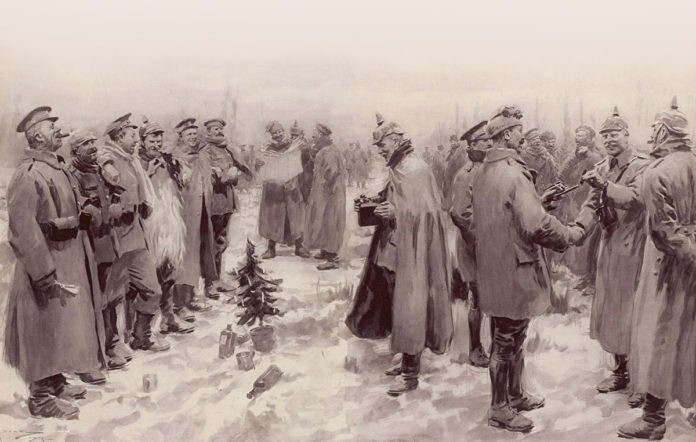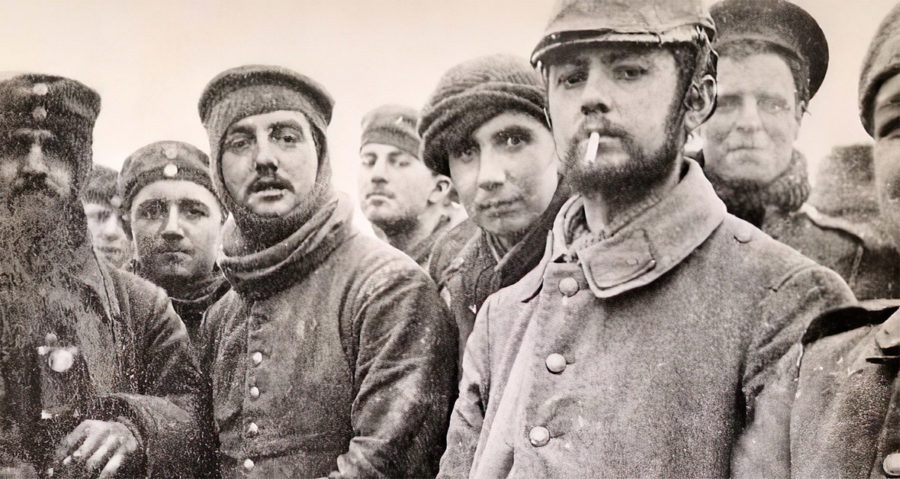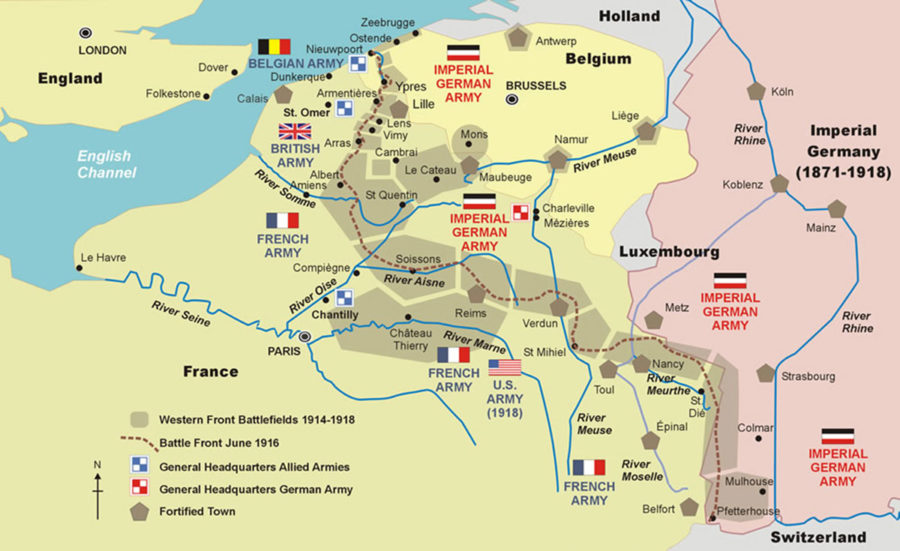
A remarkable thing happened in the early months of World War I — the Christmas Truce of 1914, when the holiday spirit halted the war for a day-and-a-half in some sections of the Western Front between France and Belgium. British and German soldiers were dug in beneath the frozen ground, fighting from long lines of cold, dank and muddy trenches, often separated from the enemy by only a few hundred yards, with barbed wire dividing the area known as No Man’s Land.
The story of the unofficial — and sporadic — truce has been told, retold, celebrated, criticized and later downplayed by the Germany military for more than a century.
But the soldiers who were there, whose diaries, photographs and recorded oral interviews describe the unprecedented holiday celebration, say they will never forget Christmas Day 1914.
“We shared fags (cigarettes) and goodies with the Germans,” recalled Ernie Williams, a member of England’s 6th Battalion, Cheshire Regiment, in an interview with the Imperial War Museums in Great Britain.
From out of nowhere a soccer ball appeared and more than 100 soldiers from each side enjoyed a “kick around,” Williams said. “I had a go at it myself. I was rather good back then, at 19.”

The story remains one of the strangest and most sentimental of all holiday tales, but such a truce has never been repeated, not even the following year in 1915, when the war had crippled both sides for 18 months and would continue for three more years.
British machine gunner Bruce Bairnsfather, later a prominent cartoonist, wrote about the Christmas Truce of 1914 in his memoirs. Like most of his fellow infantrymen of the 1st Battalion of the Royal Warwickshire Regiment, he was spending the holiday eve shivering in the muck, trying to keep warm. Then, in a part of Belgium called Bois de Ploegsteert, he was crouched in a trench 3 feet deep by 3 feet wide, his days and nights marked by an endless cycle of sleeplessness and fear, stale biscuits and cigarettes too wet to light, reports History.com.
“‘Here I was, in this horrible clay cavity,’ Bairnsfather wrote, ‘…miles and miles from home. Cold, wet through and covered with mud. There didn’t seem the slightest chance of leaving — except in an ambulance.”
Then the singing started. Around 10 p.m. on Christmas Eve, Bairnsfather asked a fellow soldier in his trench, “Do you hear the Boches [Germans] kicking up that racket over there?”
The Germans were singing carols. An enemy soldier, speaking in English with a strong German accent, called out, “Come over here.” One of the British sergeants answered, “You come halfway. I come halfway.”
“Enemy soldiers began to climb nervously out of their trenches, to meet in No Man’s Land that separated the armies. After months of communicating only with streaking bullets, with occasional gentlemanly allowances to collect the dead, there were now handshakes and words of kindness. The soldiers traded songs, tobacco and wine, joining in a spontaneous holiday party in the cold night.
“Here they were — the actual, practical soldiers of the German army. There was not an atom of hate on either side,” Bairnsfather wrote.
The truce took place along various pockets of the Western front, although it was not formally approved by the officers in charge, who later hung signs ordering soldiers to remain in the trenches during daylight.
When the war had begun a few months prior, soldiers on both sides presumed they would make short work of the enemy and be home in time for the holidays.

“Not only would the war drag on for four more years, but it would prove to be the bloodiest conflict ever up to that time,” History.com reports. “The Industrial Revolution had made it possible to mass-produce new and devastating tools for killing — among them fleets of airplanes and guns that could fire hundreds of rounds per minute. And bad news on both sides had left soldiers with plummeting morale. There was the devastating Russian defeat at Tannenberg in August 1914 and the German losses in the Battle of the Marne a week later.
“By the time winter approached in 1914, and the chill set in, the Western Front stretched hundreds of miles. Countless soldiers were living in misery in the trenches on the fronts, while tens of thousands had already died.”
But then Christmas came.
In a letter to his wife, a British rifleman named J. Reading described his holiday experience: “My company happened to be in the firing line on Christmas Eve, and it was my turn…to go into a ruined house and remain there until 6:30 on Christmas morning. During the early part of the morning the Germans started singing and shouting, all in good English. They shouted out: ‘Are you the Rifle Brigade; have you a spare bottle? Iif so we will come halfway and you come the other half.’
“Later on in the day they came towards us,’ Reading wrote. “And our chaps went out to meet them…I shook hands with some of them, and they gave us cigarettes and cigars. We did not fire that day, and everything was so quiet it seemed like a dream.”
Another British soldier, named John Ferguson, recalled it this way: “Here we were laughing and chatting to men whom only a few hours before we were trying to kill!”

























